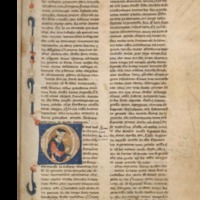Papers by Venetia Bridges
Cambridge University Press eBooks, Jul 31, 2023
Oxford University Press eBooks, Apr 27, 2023

According to Chaucer’s Monk, Alexander the Great’s presence in the Auchinleck manuscript is unrem... more According to Chaucer’s Monk, Alexander the Great’s presence in the Auchinleck manuscript is unremarkable: "The storie of Alisaunder is so commune That every wight that hath discrecioun Hath herd somewhat or al of his fortune." For the Monk, Alexander’s story is an exemplum of ‘false Fortune’ despite his chivalric glories (‘of knyghthod and of fredom flour’). The use of Alexander as an exemplum is indeed ‘commune’ in late-fourteenth-century literary culture, as shown by contemporary texts like John Gower’s Confessio Amantis, in which Alexander (educated by Aristotle) is the perfect kingly ruler. Gower’s deployment of Alexander in this way is not an innovation, since the Macedonian is found as an exemplum throughout his medieval literary career. Yet not all treatments of Alexander are equally didactic. The ‘storie of Alisaunder’ found in romance material is a multifaceted weaving together of ethical and philosophical reflection, battle prowess, and marvels both Oriental and magical. As his legend develops from late antiquity, the common feature in the accreted narratives is variety, making Alexander and his story a complex phenomenon, based in history yet depicted in fictive literature from an early date, and ethically ambivalent despite the conqueror’s frequent extrapolation as an exemplum. The Monk’s statement that Alexander is ‘commune’ is therefore accurate only up to a point. The Macedonian hero may well have been ubiquitous, but his ‘fortune’ was not a single one nor always easy to interpret from an exemplary standpoint. Before individual narratives and witnesses are considered, Alexander himself, a hero-villain who occupies indeterminate territory between history and fiction, makes contextualizing his narratives a difficult business.

The Auchinleck Manuscript: New Perspectives, 2016
According to Chaucer’s Monk, Alexander the Great’s presence in the Auchinleck manuscript is unrem... more According to Chaucer’s Monk, Alexander the Great’s presence in the Auchinleck manuscript is unremarkable: "The storie of Alisaunder is so commune That every wight that hath discrecioun Hath herd somewhat or al of his fortune." For the Monk, Alexander’s story is an exemplum of ‘false Fortune’ despite his chivalric glories (‘of knyghthod and of fredom flour’). The use of Alexander as an exemplum is indeed ‘commune’ in late-fourteenth-century literary culture, as shown by contemporary texts like John Gower’s Confessio Amantis, in which Alexander (educated by Aristotle) is the perfect kingly ruler. Gower’s deployment of Alexander in this way is not an innovation, since the Macedonian is found as an exemplum throughout his medieval literary career. Yet not all treatments of Alexander are equally didactic. The ‘storie of Alisaunder’ found in romance material is a multifaceted weaving together of ethical and philosophical reflection, battle prowess, and marvels both Oriental and magical. As his legend develops from late antiquity, the common feature in the accreted narratives is variety, making Alexander and his story a complex phenomenon, based in history yet depicted in fictive literature from an early date, and ethically ambivalent despite the conqueror’s frequent extrapolation as an exemplum. The Monk’s statement that Alexander is ‘commune’ is therefore accurate only up to a point. The Macedonian hero may well have been ubiquitous, but his ‘fortune’ was not a single one nor always easy to interpret from an exemplary standpoint. Before individual narratives and witnesses are considered, Alexander himself, a hero-villain who occupies indeterminate territory between history and fiction, makes contextualizing his narratives a difficult business.
The Encyclopedia of Medieval Literature in Britain, 2017
Cultural Translations in Medieval Romance, Jan 14, 2022
Medieval Romance, Arthurian Literature, Oct 15, 2021
The Encyclopedia of Medieval Literature in Britain, 2017
The Encyclopedia of Medieval Literature in Britain, 2017
Medieval Narratives of Alexander the Great, 2018

Medium Aevum, 2012
Historicisms, new and old, remain literary criticism's most productive procedures for anchori... more Historicisms, new and old, remain literary criticism's most productive procedures for anchoring a text so that it does not float entirely clear into absolute subjectivity or theoretical 'contexdessness'.1When considering 'Goliardie' poetry it is often frustratingly impossible to 'anchor' a text in this way. The erotic, satirical, parodie, and generally scurrilous contents of famous 'Goliardie' collections such as the Carmina Burana are often distincdy lacking in historical references, leaving the reader interested in studying mem as productions of meir historical-literary contexts wimout clear starting points. This is not a new observation: over uhirty years ago, A. G Rigg remarked that his research into the aumorship of 'Goliardie' poetry had led him into a similarly opaque situation mat he described as 'the realm of ghosts'.2 He went on to say mat this spectral state of affairs was not confined to questions of authorship and attr...











Uploads
Papers by Venetia Bridges